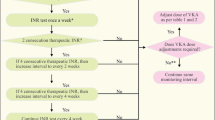Abstract
Objective
Despite various innovations, there is no ideal prosthetic heart valve; thus, patients with prosthetic heart valves still require anticoagulation therapy. This is a retrospective study to identify the optimum warfarin dose and international normalized ratio (INR) in Indian patients with prosthetic heart valves.
Methods
All patients who had prosthetic heart valves from September 2013 to February 2014 at the Madras Medical Mission, Chennai, were reviewed. Patient’s data from the institution computer archive and case notes were imputed into Excel worksheet for data analysis.
Results
One hundred and twenty-one Indian patients had prosthetic heart valves during this period, the mean age was 44.94 ± 15.70 (years) and mean body surface area was 1.59 ± 0.19 (kg/m2). The male/female ratio was 1:1.2. Seventy-seven patients had mechanical valves whilst 44 had tissue valves. St. Jude Medical bileafet valve was the commonest mechanical valve used. Warfarin was the only anticoagulant used in all patients. Amongst the mechanical valve group, the mean warfarin dose was 4.9 ± 1.87 (mg) and mean INR was 2.16 ± 0.60. In patients with tissue valves, the mean warfarin dose was 3.77 ± 1.74 and mean INR was 2.3 ± 0.68. There was no significant difference in the INR of patients with mechanical valves and atrial fibrillation and those without atrial fibrillation. Warfarin was however discontinued at 3 months for patients with tissue valves. Five (4.13 %) patients died perioperatively. Haemorrhagic complications occurred in 5.2 %, noticed when INR was >3 whilst thrombotic complications occurred in 2.6 % of patients (INR < 1.5) in the mechanical valve group
Conclusion
Oral anticoagulants in Indian patients with mechanic heart valves can be maintained safely at a lower INR (1.56–2.76) as against the standard ranges in the guidelines by the American College of Chest Physicians.
Similar content being viewed by others
References
Mendis S, Puska P, Norrving B. Global Atlas on Cardiovascular Disease Prevention and Control, editors. World Health Organization, Geneva; 2011. p. 50–62.
Krishna Kumar R, Tandon R. Rheumatic fever and rheumatic heart disease: The last 50 years. Indian J Med Res. 2013;137:643–58.
Ramakrishnan S, Shyam S, et al. Rheumatic heart disease: has it declined in India? Natl Med J India. 2009;22:72–4.
Guyatt GH, Aki EA, Crowther M, Gutterman DD, Schuunemann HJ. Antithrombotic Therapy and Prevention of Thrombosis, 9th ed: American College of Chest Physicians Evidence-Based Clinical Practice Guidelines. Chest. 2012;141:7s–47s.
Mori T, Asano M, Ohtake H, et al. Anticoagulants therapy after prosthetic heart valve replacement—optimal PT-INR in Japanese patients. Ann Thorac Cardiovasc Surg. 2002;8:83–7.
Torella M, Torella D, Naggi G, Chiodini P, Torella M, De Santo LS. Oral anticoagulant after mechanical heart valve replacement: low intensity regimen can make the difference. J Clin Exp Cardiolog. 2014;5:319.
Dhanya PS, Kuriakose KM, Puthiyaveetil N. Pattern of oral anticoagulant use following prosthetic heart valve replacement: a prospective observational study. Indian J Thorac Cardiovasc Surg. 2011;27(3):119–24.
Massel DR, Little SH. Antiplatelet and anticoagulation for patients with prosthetic heart valves. Cochrane Database of Systematic Review 2013, Issue 7. Art. No. CD003464.
Akhtar RP, Abid AR, Zafar H, Khan JS. Anticoagulation in Patients following Prosthetic heart valves replacement. AnnThorac Cardiovasc Surg. 2007;15:10–7.
Puskas J, Gerdisch M, Nichols D, et al. Reduced anticoagulation after mechanical aortic heart valve replacement: interim results from the prospective randomised on-X valve anticoagulation clinical trial randomized Food and Drug Administration investigational device exemption trial. J Thorasc Cardiovasc Surg. 2014;147:202–10.
Author information
Authors and Affiliations
Corresponding author
Ethics declarations
No external supports were received for this study.
Conflict of interest
The authors declare that they have no competing interests.
Rights and permissions
About this article
Cite this article
Omoregbee, B.I., Jamesraj, J., Sanni, S.B. et al. Optimum INR in patients with prosthetic heart valve replacement. Indian J Thorac Cardiovasc Surg 32, 174–177 (2016). https://doi.org/10.1007/s12055-016-0434-5
Received:
Revised:
Accepted:
Published:
Issue Date:
DOI: https://doi.org/10.1007/s12055-016-0434-5




